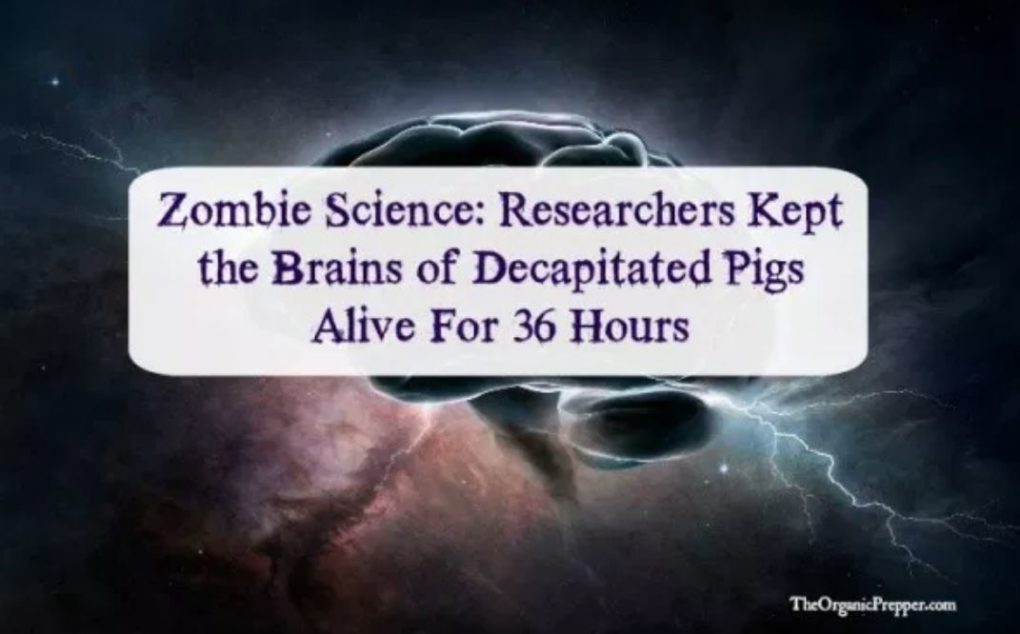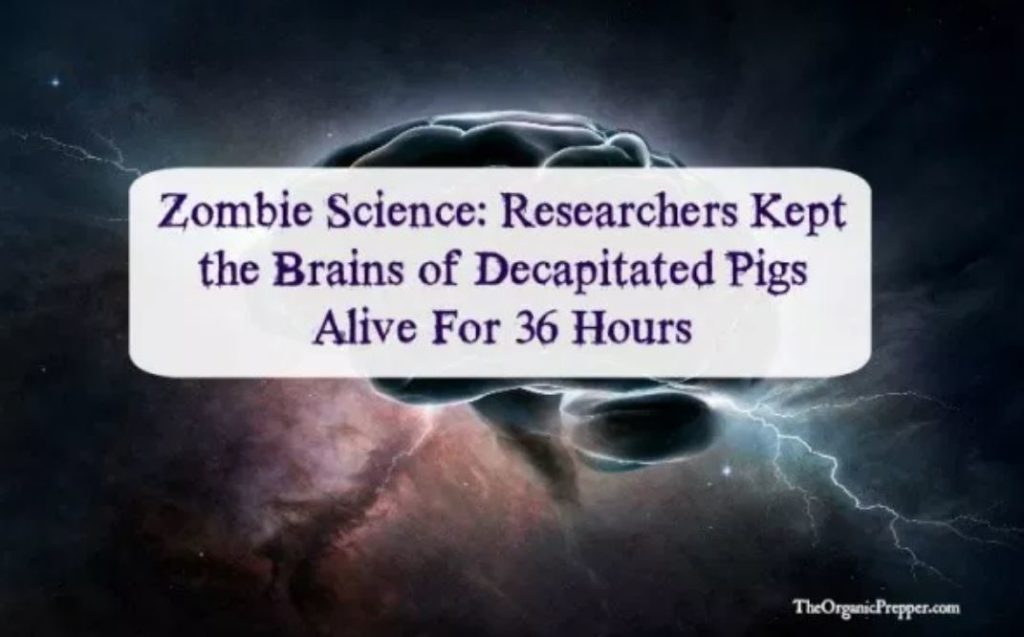Zombie Science: Researchers Kept the Brains of Decapitated Pigs Alive For 36 Hours
Scientists seem to be crossing a lot of boundaries as of late, which begs the question: Just because they can do something, does it mean they should?
Advances in brain-related technology are reaching dystopian levels. Scientists recently developed the ability to predict our choices before we are consciously aware of them, and can now translate people’s thoughts into speech. Smart chips that will create super-intelligent humans are in development, and China is mining data from the brains of citizens.
While there are legitimate uses for some of this technology, it doesn’t take much stretch of the imagination to realize that much of it could also be used for nefarious purposes.
Widget not in any sidebars
Are scientists taking some research too far?
Developments in artificial intelligence are both fascinating and terrifying, but they pale in comparison to a recent discovery in neuroscience.
This headline caught my attention a few days ago:
Yale Scientists Kept Decapitated Pigs’ Brains Alive for 36 Hours
That article goes on to explain the study:
In March 2018, Yale neuroscientist Nenad Sestan shared a remarkable bit of news with his peers at a National Institutes of Health (NIH) meeting: he was able to keep pigs’ brains “alive” outside their bodies for up to 36 hours.
The news quickly made its way from that meeting to the media. And now, more than a year later, the details of the radical study have finally been published in the highly respected journal Nature, confirming that what sounded initially like science-fiction was actually sound science — and raising startling questions about what it really means to be “dead.” (source)
A press release titled Pig brains kept alive outside body for hours after death outlines the details of the study:
Researchers at Yale University in New Haven, Connecticut, hooked the organs to a system that pumped in a blood substitute. The technique restored some crucial functions, such as the ability of cells to produce energy and remove waste, and helped to maintain the brains’ internal structures. (source)
Sestan wanted to know if a whole brain could be revived hours after death, so he decided to find out…
…using severed heads from 32 pigs that had been killed for meat at a slaughterhouse near his lab. His team removed each brain from its skull and placed it into a special chamber before fitting the organ with a catheter. Four hours after death, the researchers began pumping a warm preservative solution into the brain’s veins and arteries.
The system, which the researchers call BrainEx, mimics blood flow by delivering nutrients and oxygen to brain cells. The preservative solution the team used also contained chemicals that stop neurons from firing, to protect them from damage and to prevent electrical brain activity from restarting. Despite this, the scientists monitored the brains’ electrical activity throughout the experiment and were prepared to administer anaesthetics if they saw signs that the organ might be regaining consciousness. (source)
The researchers tested how well the brains fared during a six-hour period.
Here’s what they found:
…neurons and other brain cells had restarted normal metabolic functions, such as consuming sugar and producing carbon dioxide, and that the brains’ immune systems seemed to be working. The structures of individual cells and sections of the brain were preserved — whereas cells in control brains, which did not receive the nutrient- and oxygen-rich solution, collapsed. And when the scientists applied electricity to tissue samples from the treated brains, they found that individual neurons could still carry a signal.
But the team never saw coordinated electrical patterns across the entire brain, which would indicate sophisticated brain activity or even consciousness. The researchers say that restarting brain activity might require an electrical shock, or preserving the brain in solution for extended periods to allow cells to recover from any damage they sustained while deprived of oxygen. (source)
This research revealed some shocking information.
It appears that the death of brain cells may not be as sudden, or as irreversible, as previously believed. The cells of the brain remained viable six hours later, compared with other brains not preserved using the newly developed process, the researchers reported.
This study revealed a surprising degree of resilience among cells within a brain that has lost its supply of blood and oxygen, Sestan said. “Cell death in the brain occurs across a longer time window than we previously thought,” he explained.
“Although the experiments stopped short of restoring consciousness, they raise questions about the ethics of the approach — and, more fundamentally, about the nature of death itself. The current legal and medical definitions of death guide protocols for resuscitating people and for transplanting organs,” the press release states.
“For most of human history, death was very simple,” says Christof Koch, president and chief scientist of the Allen Institute for Brain Science in Seattle, Washington. ”Now, we have to question what is irreversible.”
In most countries, a person is considered to be legally dead when brain activity ceases or when the heart and lungs stop working. The brain requires an immense amount of blood, oxygen and energy, and going even a few minutes without these vital support systems is thought to cause irreversible damage. (source)
The researchers say their findings might lead to new therapies for stroke and other conditions, as well as provide a new way to study the brain and how drugs work in it. They said they had no current plans to try their technique on human brains.
Last year, Sestan said the BrainEx system is far from ready for use in people – not least because it is difficult to use without first removing the brain from the skull.
This study and its possible uses raise serious ethical concerns.
Do the possible implications and consequences of this research send chills down your spine?
We’ve long been told that the brain cannot survive long without blood – that brain deterioration begins within minutes, and death soon follows.
This study brings those beliefs into question and raises some serious concerns about ethical issues.
Scientists – both those involved with the study and some who were not – have weighed in on the ethical issues surrounding this type of research and its possible uses, reports the Associated Press:
Christof Koch, president of the Allen Institute for Brain Science in Seattle, who didn’t participate in the study, said he was surprised by the results, especially since they were achieved in a large animal.
“This sort of technology could help increase our knowledge to bring people back to the land of the living” after a drug overdose or other catastrophic event that deprived the brain of oxygen for an hour or two, he said. Unlike the pig experiments, any such treatment would not involve removing the brain from the body.
The pig work also enters an ethical minefield, he said. For one thing, it touches on the widely used definition of death as the irreversible loss of brain function because irreversibility “depends on the state of the technology; and as this study shows, this is constantly advancing,” he said.
And somebody might well try this with a human brain someday, he said. If future experiments restored the large-scale electrical activity, would that indicate consciousness? Would the brain “experience confusion, delusion, pain or agony?” he asked. That would be unacceptable even in an animal brain, he said. (source)
In an editorial in Nature asserting the need for ethical guidelines for research on brain tissue, Sestan and 16 other scientists explained the various forms this tissue could take, such as samples removed via surgery or tissue grown in a lab from stem cells. They noted that “the closer the proxy gets to a functioning human brain, the more ethically problematic it becomes.”
The study also raises questions about whether brain damage and death are permanent:
Lance Becker, an emergency-medicine specialist at the Feinstein Institute for Medical Research in Manhasset, New York, says that many physicians assume that even minutes without oxygen can cause irreversible harm. But the pig experiments suggest that the brain might stay viable for much longer than previously thought, even without outside support. “This paper throws a hand grenade into the middle of what the common beliefs are,” says Becker. “We may have vastly underestimated the ability of the brain to recover.” (source)
This may be the most troubling excerpt from the ethical issues editorial:
In the meantime, scientists and governments are left to confront the legal and ethical quandaries related to the possibility of creating a conscious brain without a body. “This really is a no-man’s land,” says Koch. “The law will probably have to evolve to keep up.”
Koch wants a broader ethical discussion to take place before any researcher tries to induce awareness in a disembodied brain. “It is a big, big step,” he says. “And once we do it, it’s impossible to reverse it.” (source)
Also chilling: When MIT Technology Review contacted Sestan last year to ask a few questions about his study, he declined to elaborate, “saying he had submitted the results for publication in a scholarly journal and had not intended for his remarks to become public.”
Steve Hyman, director of psychiatric research at the Broad Institute in Cambridge, Massachusetts, was among those briefed on the work. He shared his thoughts on the experiments with MIT Technology Review:
“These brains may be damaged, but if the cells are alive, it’s a living organ. It’s at the extreme of technical know-how, but not that different from preserving a kidney.”
Hyman says the similarity to techniques for preserving organs like hearts or lungs for transplant could cause some to mistakenly view the technology as a way to avoid death. “It may come to the point that instead of people saying ‘Freeze my brain,’ they say ‘Hook me up and find me a body,’” says Hyman.
Such hopes are misplaced, at least for now. Transplanting a brain into a new body “is not remotely possible,” according to Hyman. (source)
More disturbing concerns were raised in the MIT article:
Sestan acknowledged that surgeons at Yale had already asked him if the brain-preserving technology could have medical uses. Disembodied human brains, he said, could become guinea pigs for testing exotic cancer cures and speculative Alzheimer’s treatments too dangerous to try on the living.
The setup, jokingly dubbed the “brain in a bucket,” would quickly raise serious ethical and legal questions if it were tried on a human.
For instance, if a person’s brain were reanimated outside the body, would that person awake in what would amount to the ultimate sensory deprivation chamber, without ears, eyes, or a way to communicate? Would someone retain memories, an identity, or legal rights? Could researchers ethically dissect or dispose of such a brain? (source)
If you are interested in additional information on the ethical issues surrounding this type of experiment and its possible consequences, the full editorial is worth reading and can be found here: The Ethics of Experimenting With Human Brain Tissue.
What do you think?
Do you think this study could have serious consequences? If so, what do you think this technology may be used for? Do you think the pros outweigh the cons? Please share your thoughts in the comments.
About the Author
Dagny Taggart is the pseudonym of an experienced journalist who needs to maintain anonymity to keep her job in the public eye. Dagny is non-partisan and aims to expose the half-truths, misrepresentations, and blatant lies of the MSM.
This article was sourced from The Organic Prepper.




